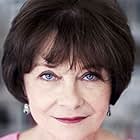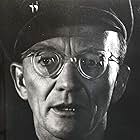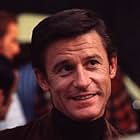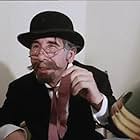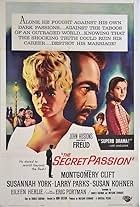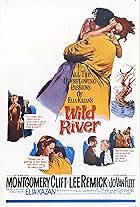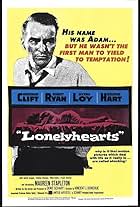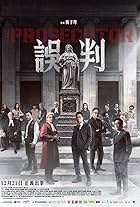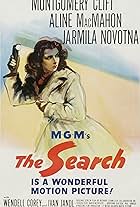An American scientist is sent by the CIA to East Germany to retrieve a secret microfilm from a Soviet scientist interested in defecting to the West but the Stasi secret police's surveillance... Read allAn American scientist is sent by the CIA to East Germany to retrieve a secret microfilm from a Soviet scientist interested in defecting to the West but the Stasi secret police's surveillance complicates matters.An American scientist is sent by the CIA to East Germany to retrieve a secret microfilm from a Soviet scientist interested in defecting to the West but the Stasi secret police's surveillance complicates matters.
Hardy Krüger
- Counselor Peter Heinzmann
- (as Hardy Kruger)
Macha Méril
- Frieda Hoffmann
- (as Macha Meril)
Roddy McDowall
- Agent Adams
- (as Roddy Mc Dowall)
Johannes Buzalski
- Spitzel
- (uncredited)
Eduard Linkers
- Fluchthelfer Franz Ritter
- (uncredited)
Rolf Zacher
- Tommy
- (uncredited)
Featured reviews
The Defector is an exciting Cold War film. It reminds me of Gregory Peck's The Chairman. Unfortunately this film is out of print. It seems that any films that deal with the Cold War are curiously going out of print or disappearing. If you get a chance see The Defector.
The Defector is the final screen appearance of the great Montgomery Clift. It is a decent enough performance, but barely matches the high standards of his earlier performances.
The film itself is typical '60s Cold War stuff, with a complex plot and lots of cloak and dagger treachery. Clift plays a scientist who is blackmailed into working as a spy behind the Iron Curtain. His cover is dangerously thin from the beginning, but by the end it has been blown wide open and he has to flee for his life. Indeed, the film only really comes to life during that final half hour or so. The build up is mildly intriguing, but not sufficiently so to make this a great film. The location photography helps to give the film a sense of authenticity, if nothing else.
I wouldn't recommend The Defector to anyone other than spy afficianados or fans of Montgomery Clift.
The film itself is typical '60s Cold War stuff, with a complex plot and lots of cloak and dagger treachery. Clift plays a scientist who is blackmailed into working as a spy behind the Iron Curtain. His cover is dangerously thin from the beginning, but by the end it has been blown wide open and he has to flee for his life. Indeed, the film only really comes to life during that final half hour or so. The build up is mildly intriguing, but not sufficiently so to make this a great film. The location photography helps to give the film a sense of authenticity, if nothing else.
I wouldn't recommend The Defector to anyone other than spy afficianados or fans of Montgomery Clift.
While making "The Defector", the director obviously went out of his way to produce a decent contemporary spy movie, containing an intricate plot, suspenseful action, beautiful scenery (lots of nice German locations – both city and countryside – and characteristic locals), tin loads of extras and an unexpected ending. Up to a point, he succeeded in his mission. The movie is certainly enjoyable enough to watch. Unfortunately there are also some drawbacks causing it not to exceed the level of decent mediocrity. I suppose the problem is in the direction, for the leading actors are top-quality performers and the plot and scene setting are lifelike enough. In my experience, the dialogues are very clear – so clear, in fact, that they tend to lose the sort of grim realism and shadiness that might have added to the overall mood expected from this movie genre. The scenes are framed in such a way the viewer is in no doubt what is going on, but is not sucked in at the same time. From what we see, we understand it's all very serious business, but it just doesn't feel that way. The mental torture session in the specially prepared hotel room is gruesome, but it does not send shivers up our spines. The same thing goes for some other scenes in which Bower (Clift) is grilled by the Stasi. The slight caricature qualities of some of the additional characters (uniformed guards, labourers, Frieda Hoffman's (Macha Méril) flat mates) plus the occasionally corny traditional music are not helpful in this respect (the alienating sci-fi music in the torture scene is different – I suppose this was composed by Serge Gainsbourg – the rest seems miles away from his style). I do appreciate the ending of "The Defector", which leaves room for speculation (= did this happen by accident or on purpose?), but again, I was not as much in awe as I felt I should have been. In short, "The Defector" meets the mark, but could have done without a certain degree of directional awkwardness.
9hfk
I really enjoyed this gem. I gave it a go despite the mixed reviews, in part because I was interested in Clift's performance. I'm glad I did. I've reached a certain point in life: I cannot finish watching movies I feel are mediocre, and even those movies I decide to watch often put me to sleep. This movie is well beyond mediocre, and I was wide awake for all of it.
The Defector has the feel of other cold-war spy flicks of the era: dry, dark, and pessimistic (words that also describe Clift's performance). It's filmed in color but feels as though it should have been b/w: gray is better suited to these movies. Of course, there are touches of warmth and beauty, including a love affair and the self-sacrifice of good people to a higher cause. I thought the ending interesting: I won't give it away but keep an eye out for what I believe to be a telling glance between Roddy McDowell and another man. I almost missed it....
The Defector has the feel of other cold-war spy flicks of the era: dry, dark, and pessimistic (words that also describe Clift's performance). It's filmed in color but feels as though it should have been b/w: gray is better suited to these movies. Of course, there are touches of warmth and beauty, including a love affair and the self-sacrifice of good people to a higher cause. I thought the ending interesting: I won't give it away but keep an eye out for what I believe to be a telling glance between Roddy McDowell and another man. I almost missed it....
During the espionage film craze of the 1960's, "spy" movies generally fell into one of two categories: the colorful, just-for-fun spoofs full of whiz-bang gadgetry and exotic sexpots, and the "serious" examinations of the cold war and - most pointedly - its effect on those caught up in it. THE DEFECTOR, which has more than a little in common with Hitchcock's "Torn Curtain" from the same year, is of the latter type.
As an American physicist recruited by the CIA for a behind-the-iron-curtain mission, Clift is, as always, fascinating to watch. Of all the screen's best-known method actors, he was the only one who never let the mechanics show. With a performer like Brando, one can often sense what the actor's thinking. With Monty, you sense what the character is thinking. Add to this the high-wire nature of the personal vulnerability he projected in his performances (especially the later ones), and the sum is never less than compelling. He often utilized that quality as an effective element of his characterizations, and as a man of letters whose life appears to consist entirely of his twin devotions to science and art, and who finds himself in dangerous territory (emotional and otherwise), it works well here. Despite Clift's often obvious frailty, he executes some rather demanding physical feats, and this, too, fits within the characterization of a man who discovers, by necessity, strengths he hadn't known he possessed.
As espionage drama, THE DEFECTOR is strictly routine, but it's enlivened by both some unexpected plot twists and the presence of players such as Roddy MacDowall as the genial but oily operative who employs blackmail-with-a-smile to enlist Clift's cooperation, David Opatoshu as a not-to-be-crossed intelligence overseer and - most outstandingly - Hardy Kruger as Clift's equally unwilling eastern bloc counterpart. Kruger was an immensely engaging performer, and his scenes with Clift feature some entertaining sparring (between both the characters and the actors).
Director Raoul Levy (who, only a year younger than Clift, also died during the year of the film's release) unfortunately yields to some now-dated 60's-style psychedelia, but it's fairly brief, and he largely keeps the proceedings on a straightforward and even keel. If the film has one quality which lifts it above the norm for the genre, it's the attention it pays to the humanity of the characters - both major and minor - in all its forms, from the noblest to the basest.
THE DEFECTOR is, overall, an intelligent - if not showy - film, and although not terribly remarkable otherwise, definitely worthwhile for any Montgomery Clift devotee.
As an American physicist recruited by the CIA for a behind-the-iron-curtain mission, Clift is, as always, fascinating to watch. Of all the screen's best-known method actors, he was the only one who never let the mechanics show. With a performer like Brando, one can often sense what the actor's thinking. With Monty, you sense what the character is thinking. Add to this the high-wire nature of the personal vulnerability he projected in his performances (especially the later ones), and the sum is never less than compelling. He often utilized that quality as an effective element of his characterizations, and as a man of letters whose life appears to consist entirely of his twin devotions to science and art, and who finds himself in dangerous territory (emotional and otherwise), it works well here. Despite Clift's often obvious frailty, he executes some rather demanding physical feats, and this, too, fits within the characterization of a man who discovers, by necessity, strengths he hadn't known he possessed.
As espionage drama, THE DEFECTOR is strictly routine, but it's enlivened by both some unexpected plot twists and the presence of players such as Roddy MacDowall as the genial but oily operative who employs blackmail-with-a-smile to enlist Clift's cooperation, David Opatoshu as a not-to-be-crossed intelligence overseer and - most outstandingly - Hardy Kruger as Clift's equally unwilling eastern bloc counterpart. Kruger was an immensely engaging performer, and his scenes with Clift feature some entertaining sparring (between both the characters and the actors).
Director Raoul Levy (who, only a year younger than Clift, also died during the year of the film's release) unfortunately yields to some now-dated 60's-style psychedelia, but it's fairly brief, and he largely keeps the proceedings on a straightforward and even keel. If the film has one quality which lifts it above the norm for the genre, it's the attention it pays to the humanity of the characters - both major and minor - in all its forms, from the noblest to the basest.
THE DEFECTOR is, overall, an intelligent - if not showy - film, and although not terribly remarkable otherwise, definitely worthwhile for any Montgomery Clift devotee.
Did you know
- TriviaLast movie of Montgomery Clift.
- GoofsAt the end of the film when Montgomery Clift shouts, "Don't move him!" his lips are clearly forming other words.
- Quotes
Counselor Peter Heinzmann: He seems to suffer from a disease I can only call "espionitus".
- Crazy creditsMost items in the closing credits appear and/or disappear in time with rhythms in the final music.
- ConnectionsFeatured in Making Montgomery Clift (2018)
- How long is The Defector?Powered by Alexa
Details
- Release date
- Countries of origin
- Languages
- Also known as
- Lautlose Waffen
- Filming locations
- Tierpark Hellabrunn, Munich, Bavaria, Germany(zoo - with elephant building in the background)
- Production companies
- See more company credits at IMDbPro
Box office
- Budget
- $1,500,000 (estimated)
- Runtime1 hour 40 minutes
- Sound mix
- Aspect ratio
- 1.85 : 1
Contribute to this page
Suggest an edit or add missing content












